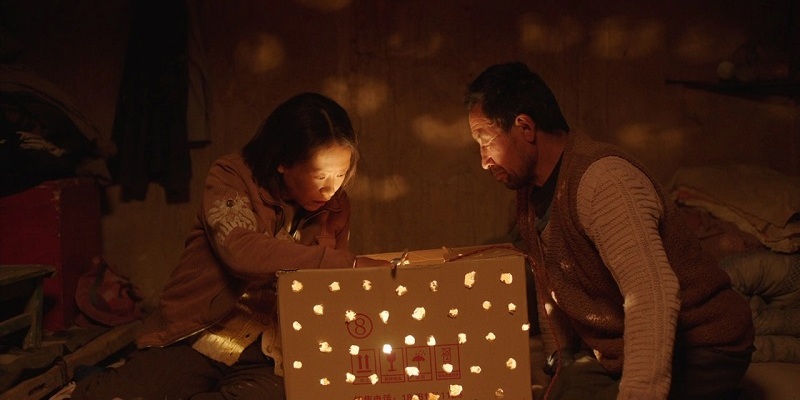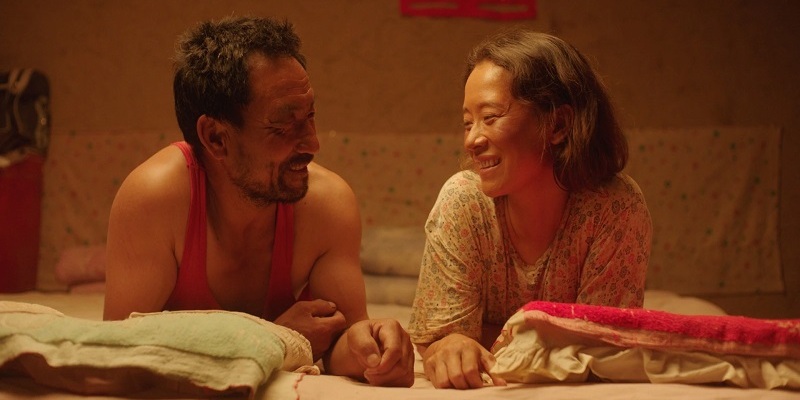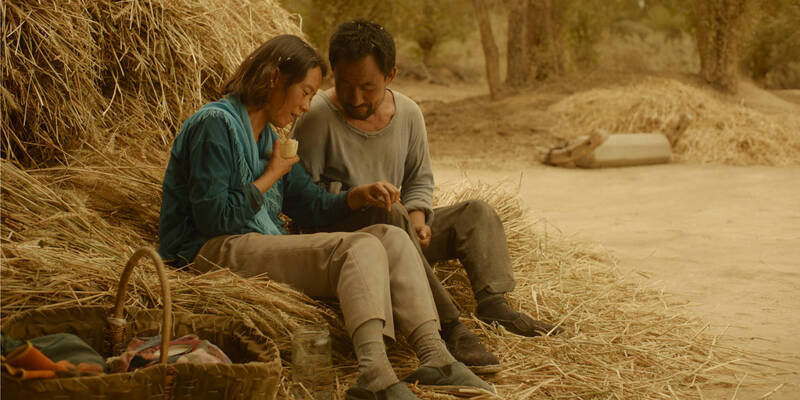
Review by
Benjamin Poole
Directed by: Li Ruijun
Starring: Wu Renlin, Hai Quing

Aka the film the CCP doesn’t want you to see... Following a glowing
reception at Berlin and Edinburgh, and an impressive box office return of
100 million yuan on a budget of 2 million, Li Ruijun’s beautiful
drama Return to Dust has recently been withdrawn from
streaming platforms in China, and any mention of the film on the domestic
social media site Weibo has been similarly circumscribed. Censorship is
always a disappointment, but at the same time the internal embargo of
Return to Dust is a thrilling reminder of the power of the
movies, that films can and do matter. And Return to Dust, a gorgeous saga of simple people whose humble lives are elevated to the
highest of dramas, is arguably the most powerful movie of this quarter.

Over Return to Dust's epic two hours, we follow the lives of Ma Youtie (Wu Renlin)
and Cao Guiying (Hai Qing) in rural Gansu during the early 2010s.
Youtie and Guiyang are past the standard age for marriage, with Guiyang
disabled and infertile to boot (Hai Qing, objectively one of the most
beautiful people on the planet, is unrecognisable in her solemn
portrayal). Nonetheless, their families arrange a union for these
ingenuous, lost souls, and over time they fall in love as they, along with
their donkey, eke out a simple existence as farmers. Conflict duly occurs
when the properties which Youtie and Guiyang set up home in are repeatedly
demolished. This is due to a government initiative where rural homes are
destroyed in return for cash incentives for land owners (the controversial
details can be read
here). Eventually, Youtie and Guiyang build their own home using bricks made
from mud and with wood salvaged from prior demolitions.

Ruijun’s film balances an emotional immersion in Youtie and Guiyang’s
world with an occasional, deft objectivity. We are encouraged to feel for
the pair, but also recognise them as referrals to a wider, real-life
context. Wang Weihua’s photography acutely uses framing devices to
remind us that we are spectators, while Renlin and Qing’s performances
engage with poignant humanity. An example is when Youtie sits alone on a
bed, facing a mirror, overhearing his family discuss his general
uselessness while arranging a marriage to an incontinent woman: we watch
him look at himself, and receive dialogue second hand (we are not so much
hearing the dialogue directly, but seeing Youtie listen to it). The
once-removal encourages detachment, a consideration of a plight which the
film posits as typical for Chinese citizens of this age. And yet
Return to Dust’s verisimilitude is stunning, none more so than when, in an extended
montage, we see Youtie and Guiyang’s house being hand built (adding to the
authenticity is the revelation that Renlin is not a trained actor, and is,
irl, a farmer). Shot across a year, the seasons are vividly expressive of
time passing, the film’s major theme: Youtie likens the couple and their
struggle to the wheat which they farm, "when summer comes, it will be cut
down anyway." The portrayal of relationship is devastatingly
resonant too, with Renlin and Quing essaying the sort of calm and
uncomplicated companionship that should be everyone’s ideal.

The ending is a bit odd, though. Shades of when Poochie leaves The Itchy
and Scratchy show if you know what I mean... (Wikipedia has the details).
Speculation as to the reasoning behind Return to Dust’s domestic ban, and manhandled ending, generally agree that the film’s
portrayal of the Chinese poor runs counter to what the CCP wants the
populace to believe regarding the political agenda of poverty alleviation.
Allow my waffle: that the Chinese powers that be were so shook by
Return to Dust’s quiet power that they not only erased it from domestic existence and
curtailed positive mention of it, is really this film’s greatest
testament.

Return to Dust is on BFI Player and Curzon Home Cinema now.

